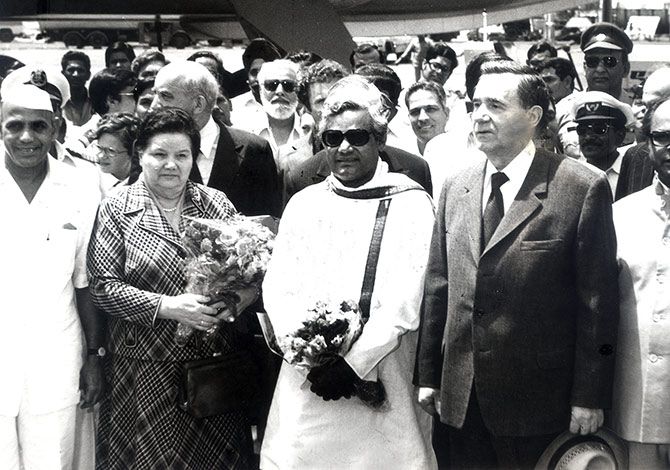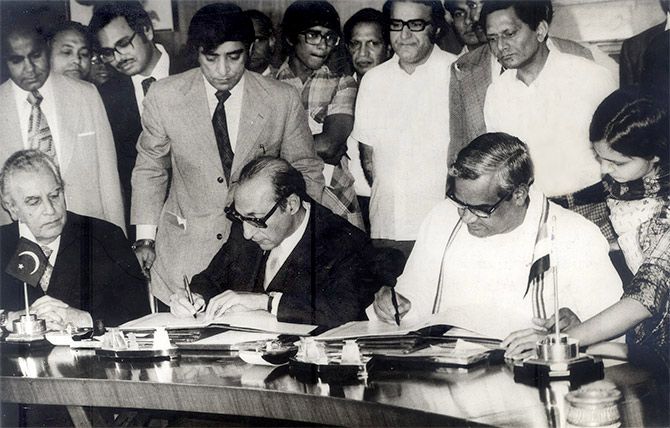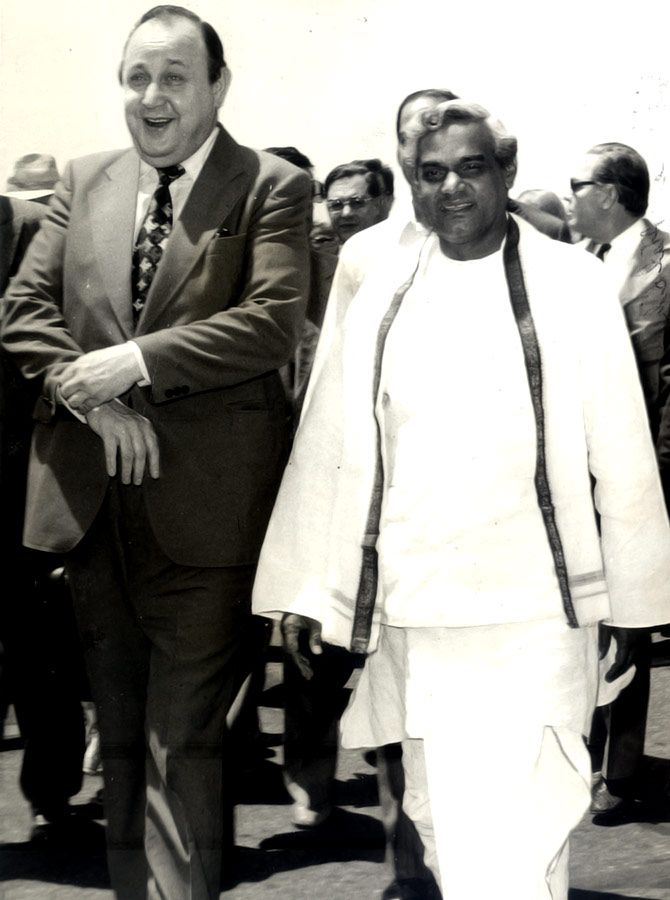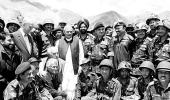'I was present at a meeting where he decided to permit the IAF to strike at Pakistan positions in Kargil, with the caveat that they should not cross the LoC.'
'Confident that the Indian Army would succeed, Mr Vajpayee was positioning himself to tell the world after the Kargil conflict was won that India did not violate the 'sanctity' of the LoC,' recalls Ambassador G Parthasarathy, who served as India's envoy in Islamabad in that eventful year, 1999.

The Janata Party government headed by Mr Morarji Desai assumed office in March 1977. Many of us working in South Block were looking forward to the arrival of the new external affairs minister, the Jan Sangh's superb orator Atal Bihari Vajpayee.
It soon became clear to us that we were going to deal with an informal and friendly minister, with a sense of humour.
With the new government asserting that it was determined to amend many policies adopted by the Congress party during the Emergency, there were doubts about how the new government, with many inimical to Indira Gandhi and the Nehru family, would conduct foreign policy.
In his first directions to Indian missions abroad, enunciating the new government's policies, Vajpayee asserted that the new policies would be marked by a blend of continuity and change.
Surprisingly, he explicitly asserted that foreign policy would adhere to the ideals of both Mahatma Gandhi and Jawaharlal Nehru.
It is this distinct trait of open-mindedness that symbolised Mr Vajpayee's conduct of foreign relations.
We soon learnt why unlike other non-Congress leaders Mr Vajpayee refused to be critical of Mr Jawaharlal Nehru. There had been a number of occasions when Mr Nehru had noted that Mr Vajpayee was a parliamentarian with potential for high office. He even once averred that the young Mr Vajpayee would one day become India's prime minister.
We observed that Mr Vajpayee was a person who preferred consensus and abhorred confrontation. This trait was visible not only in his conduct in internal politics, but also in his supervision of foreign policies.
While excessive dependence on the Soviet Union and cold relations with the Western world were the hallmark of the Emergency, Mr Vajpayee told Mr Andrei Gromyko, the Soviet Union's astute foreign minister, that he did not need to worry about any change in policies in New Delhi as: 'Indo-Soviet relations are too strong and important to be based on the electoral fortunes on any individual, or political party.'
Moreover, while Mr Vajpayee moved to effectively set right strained relations with the US and its Western allies, his passionate interest was in improving relations with all India's neighbours.
The initial 1977 Farakka Accord on the sharing of Ganga waters with Bangladesh was pushed through, despite opposition from Chaudhury Charan Singh.
Mr Vajpayee then surprised his Pakistani hosts by visiting Islamabad. His visit to China was ruined by the Chinese invasion of Vietnam during his visit.
But, in a larger perspective, this did not deter his quest for peaceful, stable and cooperative neighbourhood.

It was these qualities and experiences that served Mr Vajpayee well when he took over as prime minister. He had been cautioned by his good friend, former prime minister Narasimha Rao, about growing American and international pressures on India, to give up its nuclear option and accede to the nuclear Non-Proliferation Treaty.
Mr Vajpayee decided that the time had come to throw doubts and fears about global sanctions aside and cross the nuclear threshold.
The Pokhran nuclear tests in May 1988 signaled the beginning a new era in India's security and foreign policies.
While all five nuclear weapons powers (who are also permanent members of the United Nations Security Council) expressed opposition to the tests, Mr Vajpayee soon got Russia and France to dilute their objections.
A wide-ranging dialogue with the Clinton administration led to the US following suit. China and the UK were left to accept this new reality, which they soon did. This was unquestionably Mr Vajpayee's greatest international achievement, in his political life.
His foreign policies were complemented by his natural inclination to accelerate economic growth, through further economic liberalisation. More importantly, the China-Pakistan nuclear and missile partnership soon realised that its moves to challenge Indian diplomatic influence and national security would be countered.
Mr Vajpayee had led the country to the new road of self-reliant national security, combined with accelerating economic growth.
A new, self-confident India, proud of its technological achievements and confident of its economic potential, emerged on the world scene.

The years that followed saw this self-confident India building bridges with all major power centres -- the US, Russia, China and the European Union.
The outreach to China was strengthened with Mr Vajpayee personally undertaking a visit to the Middle Kingdom.
Within South Asia, Mr Vajpayee took concrete steps to see that the region became more integrated economically and moved towards becoming a Free Trade Area.
Determined not to allow external powers to exploit tensions between India and Pakistan, Mr Vajpayee's Bus Yatra to Lahore heralded his determination to show that he would take measures to foster peace and cooperation with Pakistan.
His speech Ab Jang Na Hone Denge (We will not allow conflict to be break out) was received with cheers in Lahore and broadcast on more than one occasion on Pakistan Television. But even as he was speaking in these terms, the Pakistan army and ISI trained 'mujahideen' crossed the Line of Control and positioned themselves on the heights of Kargil to cut off our supply lines to Siachen.
The soft-spoken Mr Vajpayee reacted decisively.
I was personally present at a meeting where he decided to permit the Indian Air Force to strike at Pakistan positions in Kargil, with the caveat that they should not cross the Line of Control.
Confident that the Indian Army would succeed, Mr Vajpayee was positioning himself to tell the world after the conflict was won that India did not violate the 'sanctity' of the Line of Control.
A chastened Nawaz Sharif rushed to Washington to bail out Pakistan, after which, he pulled out his troops and respected the 'sanctity' of the Line of Control.
The quest for durable peace led to Mr Vajpayee inviting Musharraf to Agra for a summit meeting in Agra, which was scuttled by an arrogant Musharraf who spurned Indian overtures.
The Agra Summit followed the hijacking of IC-814 to Kandahar. What came soon after Musharraf's return to Pakistan was the attack on India's Parliament by Masood Azhar's followers, all members of the Jaish e Mohammed, which Azhar headed.
This led to a massive deployment of troops on both sides of the border, which had to be pulled back after a prolonged standoff and international pressure.
Indian military pressures along the LoC led to Musharraf suing for a ceasefire. This was soon followed by an assurance by Musharraf in January 2004 that 'territory under Pakistan's control' would not be used for terrorism against India.
Mr Vajpayee soon thereafter relinquished office, but he did leave his successor, Dr Manmohan Singh, with a terrorism-free Jammu and Kashmir and the environment required for dialogue with Pakistan.
I was scathingly critical in the media of Mr Vajpayee's handling of the Kandahar hijacking and the invitation to Musharraf for the Agra Summit. A few weeks after the attack on our Parliament, I got a call from Mr Vajpayee;'s national security adviser and close confidante Brajesh Mishra inviting me to accompany a parliamentary delegation to Egypt, Syria and Jordan, to explain our anger and anguish at the Pakistan-backed attack on our Parliament.
Taken by surprise, I asked Mr Mishra how I was being invited, despite being strongly critical of the government for its handling of the IC-814 hijacking and the Musharraf visit. His reply was that what I had articulated was measured criticism, without prejudice or malice.
There is hardly any political leader in India who can accept criticism with such grace and dignity. That was one of the many attributes that distinguished Atal Bihari Vajpayee, from other, lesser mortals.










